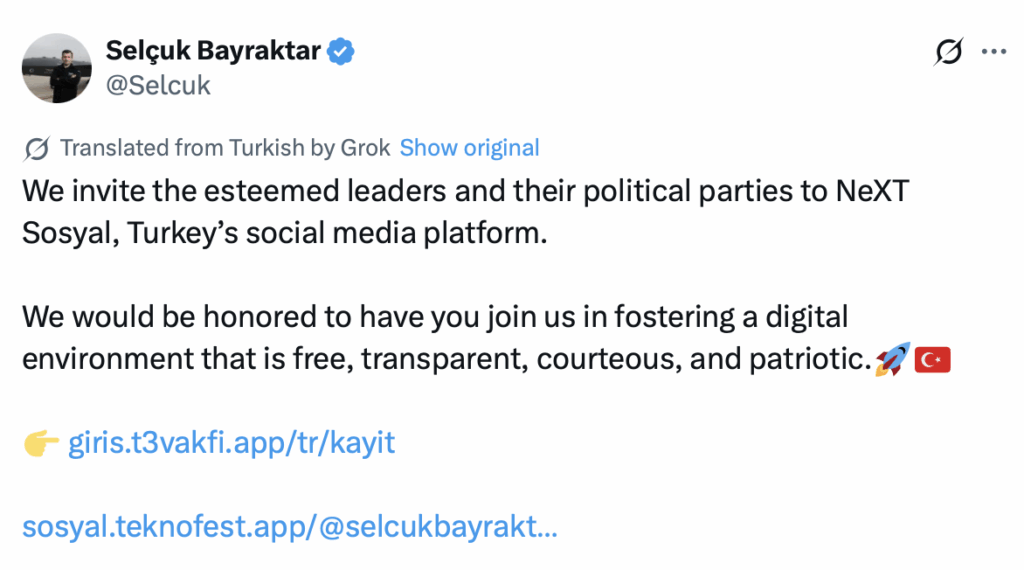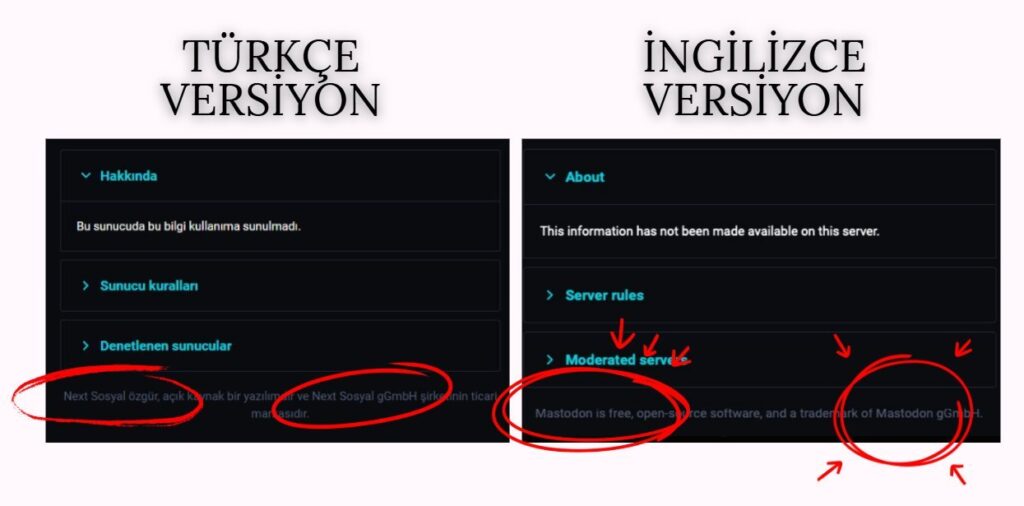Levent Kenez/Stockholm
The Turkish ruling party is increasingly pushing public institutions and citizens to migrate to a state-endorsed social media platform called Next Sosyal, prompting fears of centralized digital surveillance reminiscent of China’s WeChat. Critics argue that the platform may be a covert attempt to monitor citizens under the guise of digital independence.
Developed by Selçuk Bayraktar, one of the two owners of military drone company Baykar and the son-in-law of Turkish President Recep Tayyip Erdogan, Next Sosyal has been branded as a “local and national” alternative to global platforms such as X and Facebook. Bayraktar’s promotional campaign, supported by the pro-government media, describes the platform as a safer and cleaner space for constructive dialogue free from trolling, disinformation and Western platform algorithms.
Bayraktar recently extended an invitation to Erdogan’s far-right nationalist ally Devlet Bahçeli and other political party leaders, citing a letter that warns of “algorithmic manipulation” and promises a digital home rooted in national values. Bahçeli accepted, a gesture widely interpreted as signaling broader political alignment.

Inside Turkey’s tech circles and civil society, however, a different narrative is circulating. A close reading of Next’s code architecture reveals its roots: the platform is built on Mastodon, the open-source federated social network that originated in Germany. That fact remains hidden on the Turkish-language version of Next’s site. When the interface is switched to English, the branding refers explicitly to Mastodon. When questioned by developers, Bayraktar’s team acknowledged that the foundation was Mastodon but have so far refused to make public their modified source code or AGPL license documentation, as the Affero General Public License requires. Turkish open-source advocates assert that this omission constitutes a violation of legal obligations since the AGPL demands transparency and attribution.

“Claiming it is ‘locally developed’ while omitting any reference to Mastodon in Turkish is misleading,” wrote many software engineers on social media. According to them, not releasing the code prevents a public audit and may hide modifications that could facilitate data collection or control. Mastodon’s founder, Eugen Rochko, is reported to have contacted the Next team to remind them of the licensing terms, but no public code repository — an online platform where the software’s underlying code can be accessed and reviewed — has appeared.
Parallel to the platform’s rollout, Bayraktar is said to be developing a WhatsApp-like messaging application under the Next brand. Observers caution that a Next messaging app, once operational, could become a siloed communication channel for official or politically aligned users, consolidating mobile chat and social feed monitoring within a Turkish-branded platform.

Several ministries and public entities now maintain official Next Sosyal profiles. Staff in these offices report that social media guidance increasingly favors the platform. Press releases, bulletins and announcements are expected to appear on Next before being shared on global platforms. Some officials say internal memos suggested de-emphasizing X and Instagram entirely. In addition, some major corporations have reportedly started opening accounts on Next out of fear of government pressure.
A growing number of social media users have begun to describe this trend as part of a broader information containment strategy in which the ruling Justice and Development Party (AKP) seeks to guide its base away from international platforms where opposition voices are widespread. Some describe the move as an ecosystem for the loyal audience, suggesting that Next is designed less for open dialogue than for ideological insulation. Turkey’s recent history of internet control — including frequent blocks of YouTube, X, Wikipedia and VPN services under sweeping social media laws since 2020 — reinforces fears that Next might become another tool for government-directed discourse regulation.

Turkey’s push for a government-backed social media platform is raising alarms, especially when compared to how China uses WeChat to monitor its citizens. In China accounts linked to local phone numbers are part of a vast surveillance system. The government can access messages, call data, locations and even voice notes. Certain words are automatically censored, and both activists and regular users have been punished for what they share. Research shows that even people living abroad — especially Uyghurs — avoid using WeChat out of fear that the Chinese authorities are watching.
Although Turkey does not have the same surveillance infrastructure, its privacy laws offer little protection for user data. Without transparency or independent oversight, critics warn that Next Sosyal could also become a tool for state monitoring.
Current Forbes billionaire rankings of Selçuk and Haluk Bayraktar:


Selçuk Bayraktar is seen as one of the top contenders to lead the ruling party after President Erdogan, along with Erdogan’s son Bilal. However, many believe Bilal has a stronger chance due to his family ties.
Bayraktar appeared on Forbes’ latest billionaire list, one of 27 Turkish billionaires included. His net worth stands at $1.8 billion, placing him at 1,947th on the global list. His brother, Haluk Bayraktar, CEO of Baykar, follows closely behind at 2,110th with a net worth of $1.6 billion.
Baykar’s drones have been exported to more than 30 countries and were used in the Nagorno-Karabakh conflict between Armenian and Azerbaijani forces in 2020 as well as in Libya and Ukraine. Many observers credit the company’s rapid global rise to direct support from President Erdogan, who regularly promotes Baykar drones during official visits abroad, helping to secure multimillion-dollar defense agreements.
There is a widespread public belief that the Bayraktar brothers’ rapid rise in wealth and status was strongly influenced by their ties to the Erdogan family. However, pro-government media and political figures continue to portray Selçuk Bayraktar as a national hero.
Selçuk Bayraktar has been married to Erdogan’s daughter, Sümeyye, since 2016.












